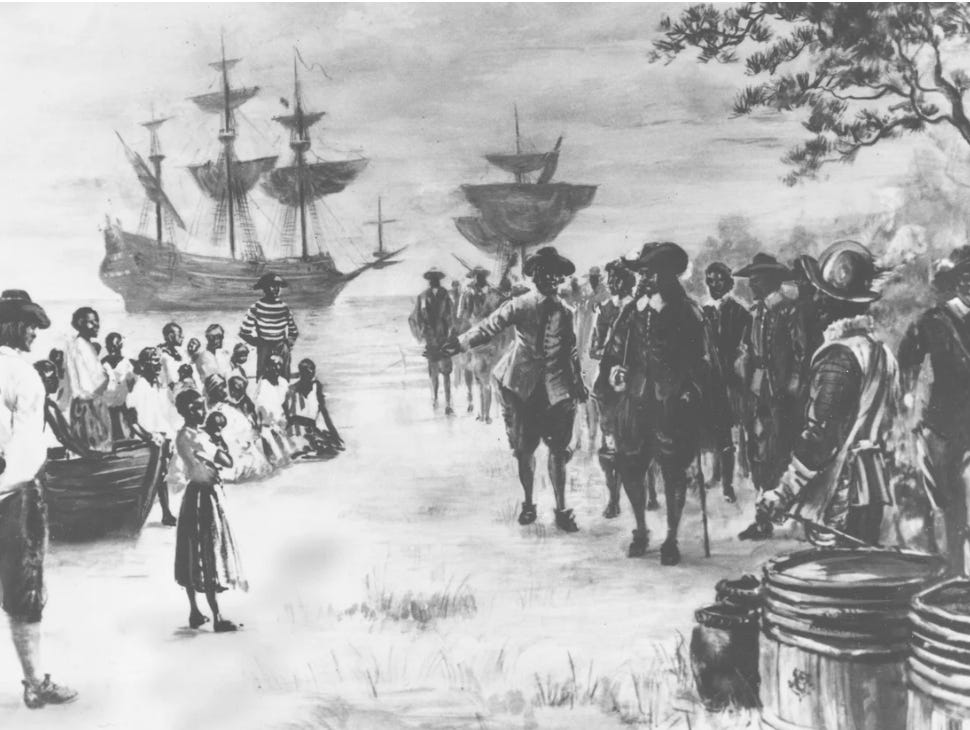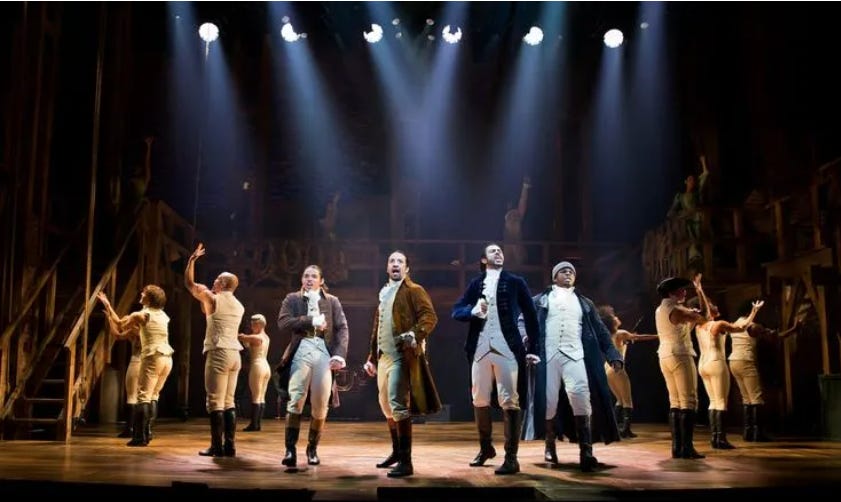Before the Mayflower
“Would America have been America without her Negro people?”
W.E.B. Du Bois
When I think of American history, the first event that comes to mind is the Civil War. I don’t know why–perhaps it’s because that’s the period I spent the most time reading about as an autistic child with a special interest in history. Or maybe it’s because I grew up in a Victorian house, and the years just before the Civil War evokes images of peak Victorian fashion.
The second event that comes to mind is the American Revolution, probably because that was the birth of America as a nation, if not the America I was born into in 1995.
And the third event that comes to mind when I think of American history is women stepping into the industrial sector during World War II, complete with vivid images of Rosie the Riveter and the beautifully sophisticated blend of practicality and femininity of 1940s women’s fashion.
These three events all have many things in common, not the least of which being a quest for freedom–though that ideal certainly took on different meanings in each century. But if we look at each of those events and pose W.E.B. Du Bois’s question from above, how might those events look different?
Many of us know the story of the Mayflower’s arrival in 1620, the courageous journey of religious separatists fleeing persecution and settling in a new, uncharted-by-Europeans land. But how many of us know the story of the White Lion, a ship that landed on the same coast the year before?
In 1619, Portuguese slave traders arrived in Angola, a nation in West Africa. They kidnapped an unknown number of the Ndongo people in a raid and set sail for the plantation colony of Vera Cruz, Mexico. In the Caribbean, however, John Jope, an English privateer who captained the White Lion, along with another English ship, the Treasurer, attacked the Portuguese ship. Not to liberate the kidnapped Ndongo people, but to kidnap them for their own exploitative purposes.
Approximately sixty people from Africa were divided between the Treasurer and the White Lion, likely the youngest and healthiest who’d survived the Atlantic crossing. These two English ships sailed north toward the British colonies.
On August 20, 1619, the White Lion arrived on the coast of the American colonies. Although the kidnapped Nodongo people who stepped foot on American soil that day were not the first Africans to come to America (the first did so nearly two centuries prior, though history has lost the date and details), August 20, 1619 is considered the birth of Africans in America. They did not come here seeking a better life, as the Europeans aboard the Mayflower did the next year. They did not come here willingly. And they didn’t know the four-plus centuries of toil that was about to begin.

What might the land known as America look like if that Portuguese slave ship had never docked on the West African coast? If no slave trader had ever set out to pillage Africa of her people? The world-altering event of the White Lion unloading the kidnapped Ndongo people has a date, but no details–there is no ship manifest to tell us the names of these people.
Because they were not people to those who brought them here. They were property. They were cargo. And nobody uniquely names an object. How harrowing is it that without Africans, America as we know it would not exist, but history didn’t bother to note the names of those from whom America exists.
History and those who have told it have certainly erased the tale of the White Lion, preferring the “heroic” narrative of those aboard the Mayflower–those whose names we know. William and Dorothy Bradford. William and Mary Brewster, and their children, Love and Wrestling. Stephen and Elizabeth Hopkins and their children, Constance, Giles, Damaris, and Oceanus, who was born during the crossing. Myles and Rose Standish. The descendants of these people and other aboard the Mayflower proudly boast of their lineage, of having more than four centuries’ worth of roots on American soil.
There is no such possibility for any descendants of those from the White Lion. We don’t even know if there are any living descendants from those twenty or so Ndongo people who landed in America in 1619.
As Nikole Hannah-Jones writes in her essay “Arrival:”
“The Adams and Eves of Black America did not arrive here in search of freedom or a better life. They had been captured and stolen, forced onto a ship, shackled, writhing in filth as they suffered and starved. [...] They embarked not as people but as property, sold to white colonists who were just beginning to birth democracy for themselves, commencing a four-hundred-year struggle between the two opposing ideas foundational to America.”
There is no “feel-good” way to tell that story. There is no pleasant version of that history, nor of the reality that history has neglected to tell that story, favoring instead the Mayflower. Can you imagine if the roles were reversed, and instead of celebrating the first Thanksgiving we did something in memorial of the White Lion?
Of course, no ceremony or vigil can undo the past. And when I look to the current regime’s January 29 executive order about the “radical indoctrination” of schoolchildren, I’m less than optimistic that America will hurry to remember the twenty or so Ndongo passengers aboard the White Lion anytime soon (certainly not when I look to Section 4 of that executive order).
So what can we do? What’s the point of me bringing this history up?
We can learn it. And we can struggle in vain, on purpose, to answer W.E.B. Du Bois’s question.
What would America be without Black America?
And why the hell is it such a problem to admit that the past is heinous? (Hint: It’s a personal problem. It’s white fragility, as Robin De Angelo writes–more on that soon.)
The truth is bitter. The true history is ugly, and there is no way to make it more palatable. To try to make it pleasant is to erase the experience that was the birth of Black America in 1619, and to do so is heinous. It’s downright unjust–an injustice on top of centuries of dehumanization. I’m called to the words of Frederick Douglass:
“To forget them, to pass lightly over their wrongs, and to chime in with the popular theme, would be treason most scandalous and shocking, and would make me a reproach before God and the world. [...] Whether we turn to the declarations of the past, or to the professions of the present, the conduct of the nation seems equally hideous and revolting. America is false to the past, false to the present, and solemnly binds herself to be false to the future.”
Before the Mayflower, American history had already begun. Black American history, which is as much a part of this nation’s foundation as the ground upon which it was built. As I consider the “end of Black History Month” per the new regime’s order, I cannot help but be reminded that we, as Americans, have a choice to make.
Do we let this “end” truly be an end, or will it be an opportunity for renewal? Instead of relegating Black history to certain days or months as a performative gesture of goodwill, will we devote ourselves anew to learning the actual Black history of America?
Because Black history is American history. They are one and the same.
We’re just used to hearing the spoils from the victors.
Will we continue to believe America arrived aboard the Mayflower?
Or will we choose to listen to the voices of those who have been victimized?
Will we rise up beside those who are currently being victimized?
Rise up
When you're living on your knees, you rise up
Tell your brother that he's gotta rise up
Tell your sister that she's gotta rise up
When are these colonies gonna rise up?
Hamilton
Until next time, rise up,
Olivia




